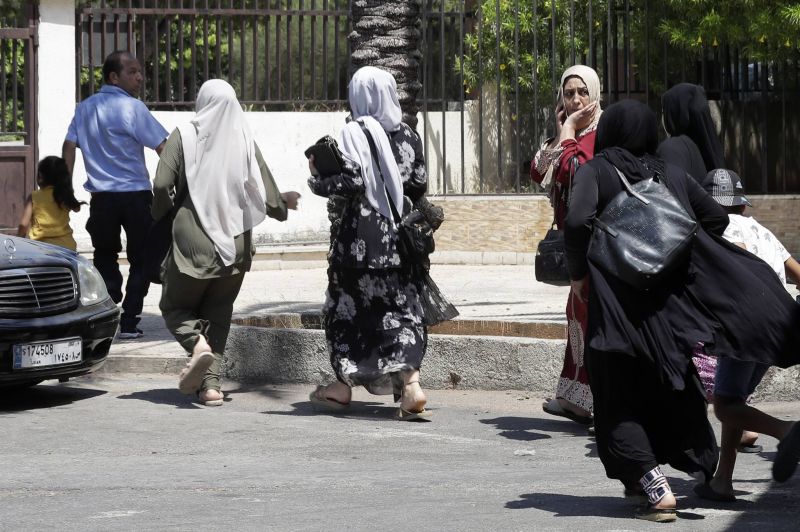
People flee the fighting in Saida's Ain al-Hilweh camp on July 30, 2023. (Credit: Mahmoud Zayyat/AFP)
Want to get the Morning Brief by email? Click here to sign up.
At least six people were killed and dozens injured since clashes between Fatah and Islamist factions began on Saturday in the Ain al-Hilweh Palestinian refugee camp in Saida. The fighting continued Monday morning after a night of relative calm, as Palestinian and Lebanese leaders reportedly planned to meet to urge a ceasefire. Saida’s government building, schools and a main road were also closed Monday morning after UNRWA announced Sunday it would suspend all its services in the camp in light of the violence. Dozens of families fled their homes amid the fighting Sunday to shelter in a nearby mosque and Saida residents urged each other to stay indoors as stray bullets hit adjacent neighborhoods. Palestinian security official Abu Ahmed al-Armoushi and four of his bodyguards were the five people killed on Sunday, Major General Mounir al-Makdah told L’Orient Today. On Saturday, “an Islamist from al-Shabab al-Muslim group was killed, and a leader in the group was among the wounded," a source inside the camp said. Previously, the killing of a Fatah member in March led to clashes between Islamist factions and the group until the alleged killer was handed over.
Longtime Banque du Liban (BDL) Governor Riad Salameh is set to end his crisis-addled 30-year term today with no successor in place, and while facing several corruption lawsuits both at home and abroad. Still, on Friday he expressed some optimism for the Lebanese economy as the date to step down approached: “The central bank could, through monetary initiatives, contain this crisis,” Salameh told Reuters, confirming that he would leave the central bank at the end of his term on Monday. BDL’s four deputy governors “agreed to remain in their positions and carry out their responsibilities,” reneging on an earlier threat to resign if no successor is named, caretaker Prime Minister Najib Mikati told L’Orient Today. First deputy governor Wissam Mansouri is scheduled to hold a press conference on the issue today. Once lauded for his shrewd control of the BDL, Salameh is today under investigation in Lebanon and Europe for alleged embezzlement of public funds. He is scheduled to attend another hearing with Beirut's First Investigative Judge Charbel Abou Samra on Wednesday.
Cabinet is scheduled to meet this afternoon in the first of "successive meetings" to discuss the 2023 preliminary draft budget. The Finance Ministry last week approved the draft budget, once it obtains government approval it will also pass through the parliamentary committees and Parliament. The entire budget approval process must typically be completed by the end of January. But last year saw it issued in September, with only three months left in the year for which it ostensibly applied. The 2023 budget is already on track for delays this year, as the ongoing presidential vacuum means both Parliament and cabinet are not fully empowered to pass certain laws.
Lead investigator in the Aug. 4, 2020 Beirut port blast probe Tarek Bitar intends to retain control over the investigation despite repeated attempts to depose him, which have stalled the case, several judicial sources told L'Orient Today. Bitar wants to continue leading the probe “unless the Higher Judicial Council and the justice minister who appointed him decide to dismiss him,” a judicial source explained, adding that the investigation, which has been stalled for over a year, “seems three-fourths complete.” The investigating judge relied on his appointment by the justice ministry in his attempt to relaunch the probe in January despite outstanding complaints filed against him which cannot be ruled on due to judicial vacancies. Top prosecutor Ghassan Oueidat interdicted Bitar’s attempt, sued him and freed detainees held in relation to the case since 2020. In June, a judge was appointed to rule on Oueidat’s complaint against Bitar. Blast victims’ relatives regularly protest against the probe’s paralysis and have planned a mass demonstration for Friday to mark three years since the deadly explosion.
Hezbollah Secretary-General Hassan Nasrallah called for Parliament to be allowed to legislate amid the presidential vacancy, awaiting the September return of French envoy Jean Yves Le Drian, who left Friday after a series of discussions aiming to overcome the electoral impasse. Speaking during a mass religious ceremony to mark Ashura, Nasrallah also called for cabinet to be allowed to “attend to its responsibilities.” The caretaker cabinet and Parliament’s functions have been controversial amid the presidential vacuum, with various boycotts challenging their prerogatives. During his second visit to Beirut, Le Drian reportedly proposed a series of consultations in September to reach an agreement between various political actors, which would be followed by consecutive election sessions.
In case you missed it, here’s our must-read story from over the weekend: “Riad Salameh: The end of an era”
Compiled by Abbas Mahfouz